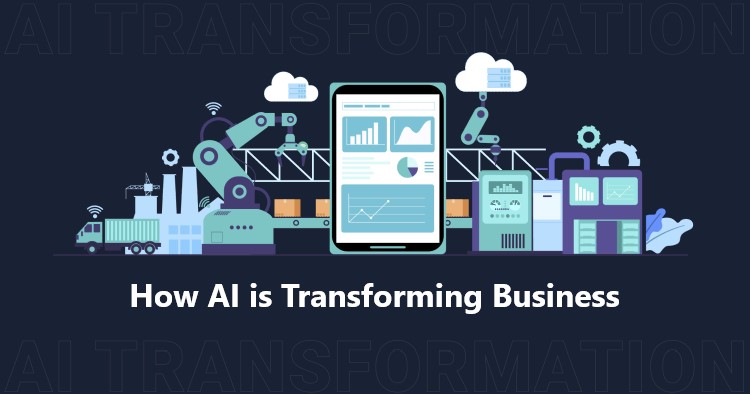
AI in Enhancing Operational Efficiency
AI is enhancing operational efficiency across industries by automating repetitive tasks, improving workflows, and reducing operational costs. Businesses no longer need to allocate staff to time-consuming, routine tasks like data entry or processing. Instead, AI-powered systems handle these activities, allowing your team to focus on higher-value work. This shift in responsibilities is a clear example of how AI is transforming business operations.
In addition to automating tasks, AI helps streamline workflows by analyzing processes and identifying inefficiencies. AI can recommend ways to optimize workflows, leading to faster, more accurate outcomes. Whether it’s improving supply chain logistics or speeding up customer service response times, AI technology enables smoother operations, which benefits both your business and your customers.
Another key advantage of AI is cost reduction. By automating tasks and optimizing workflows, AI lowers the need for manual labor and decreases the risk of costly errors. This not only increases efficiency but also improves profitability. As AI tools become more advanced, the potential for greater efficiency and reduced costs continues to grow, showing how AI is transforming business in meaningful ways across various sectors.
The Role of AI in Data-Driven Decision Making
AI plays a significant role in data-driven decision making by processing vast amounts of data quickly and accurately. It can analyze complex datasets and extract valuable insights that would be difficult for humans to identify manually. AI algorithms detect patterns, trends, and correlations in real time, helping your business make informed decisions faster. This is one of the most prominent ways how AI is transforming business today.
With AI, businesses can turn raw data into actionable insights. Whether it’s customer behavior analysis, financial forecasting, or optimizing marketing campaigns, AI enables real-time decision making that leads to better outcomes. For example, AI tools can identify sales trends or shifts in consumer preferences, allowing you to adjust your strategy immediately. This real-time analysis gives businesses a competitive edge by responding to market changes as they happen.
Moreover, AI reduces human error in decision making. By relying on data analysis, AI-driven decisions are often more objective and precise. This approach helps you improve performance, minimize risks, and make smarter investments. The ability to process large datasets and provide real-time insights is a clear example of how AI is transforming business, enabling faster, smarter decisions across all industries.
AI-Powered Customer Service and Personalization
AI-powered customer service is transforming how businesses interact with their customers. Chatbots and virtual assistants provide instant support, answering questions and solving issues in real time. These tools allow you to offer 24/7 customer service without relying on human staff. This is one clear example of how AI is transforming business, as it enables companies to respond quickly and efficiently to customer needs.
AI also plays a major role in personalized marketing. By analyzing customer data, AI can create targeted marketing campaigns that speak directly to individual preferences. For example, AI can recommend products based on past purchases or browsing habits, providing a personalized shopping experience. This level of personalization enhances customer satisfaction and increases the likelihood of conversions.
With AI, businesses can also predict customer needs and proactively offer solutions, making the entire customer journey smoother. AI-driven insights help you deliver tailored experiences that make customers feel valued. The ability to automate customer service and personalize marketing efforts shows how AI is transforming business, driving better customer experiences and improving overall engagement.
AI in Predictive Analytics and Market Forecasting
AI-driven tools are revolutionizing predictive analytics and market forecasting by enabling businesses to analyze vast datasets and identify trends with greater accuracy. AI can predict market shifts, customer behavior, and future sales patterns, allowing you to make better decisions. This real-time data analysis is one way how AI is transforming business, giving companies the ability to react quickly to changing conditions.
Using AI in predictive analytics allows businesses to anticipate consumer preferences and adjust their strategies accordingly. For example, AI can identify seasonal trends or emerging market demands, helping you forecast sales and optimize inventory. This not only reduces the risk of overstocking or stockouts but also ensures that your products meet customer needs at the right time.
Additionally, AI enhances market forecasting by combining historical data with current market conditions to predict future trends. By processing this information faster and more accurately than humans, AI enables businesses to stay ahead of competitors. AI-driven market forecasts provide actionable insights that improve decision-making and strategic planning. This ability to predict and respond to market dynamics illustrates how AI is transforming business across industries.
Ethical Considerations and Challenges in AI Implementation
As AI becomes more integrated into business processes, ethical considerations and challenges must be addressed. One major issue is bias in AI algorithms. AI systems learn from data, and if that data is biased, the AI will make biased decisions. This can result in unfair outcomes in hiring, lending, and other areas, highlighting a challenge in how AI is transforming business. To mitigate this, you need to ensure that AI systems are trained on diverse and representative datasets.
Data privacy is another critical concern. AI systems rely heavily on data, which often includes personal information. Protecting that data and ensuring compliance with privacy laws like GDPR is essential. Businesses must be transparent about how they collect, store, and use data. Failure to do so can lead to loss of consumer trust and legal consequences.
The impact of AI on jobs is another area of concern. While AI improves efficiency, it may also replace jobs, especially in roles that involve repetitive tasks. This raises ethical questions about the future of work and the responsibility businesses have to their employees. As AI continues to grow, addressing these challenges is key to ensuring that its implementation benefits society as a whole, further demonstrating how AI is transforming business.
AI in Product Innovation and Development
AI is transforming product innovation and development by accelerating the design and testing process. Using data insights and predictive modeling, AI enables faster, more accurate product development. Instead of relying on traditional trial-and-error methods, AI analyzes large datasets to identify optimal designs and features. This saves time and resources, making your product development cycle more efficient.
AI also enhances the testing phase by simulating how products will perform under different conditions. Predictive modeling allows you to forecast potential issues before they arise. This not only speeds up product refinement but also improves quality and reliability. By leveraging AI in testing, you can bring better products to market faster, which is another example of how AI is transforming business.
Furthermore, AI helps drive innovation by identifying new opportunities based on consumer data. AI can analyze trends, customer preferences, and feedback to suggest product improvements or even create entirely new product ideas. This data-driven approach ensures that your innovation aligns with market demand, giving you a competitive edge. AI’s role in product design, testing, and innovation highlights how it is reshaping business processes across industries.
Conclusion
In conclusion, AI is transforming business in many ways, from improving operational efficiency to enhancing customer experiences. By leveraging AI for data-driven decision making, predictive analytics, and product innovation, you can stay ahead in a competitive market. AI-powered tools also streamline workflows and reduce costs, helping businesses achieve faster growth. As AI continues to evolve, its impact on various industries will only increase. Understanding how AI is transforming business allows you to adapt and use these technologies to your advantage, driving success and innovation in your operations.


